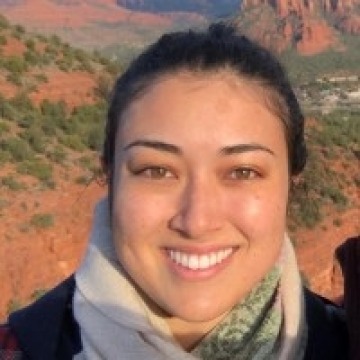
Dr. Amanda Garcia left the Tucson desert for the snows of Wisconsin in order to pioneer a new NASA program.
Garcia worked as a NASA Postdoctoral Program (NPP) fellow alongside Dr. Betul Kacar in Molecular and Cellular Biology for three years. As a postdoc at UArizona, she researched ancient enzymes, specifically reconstructing the early evolution of nitrogen fixation via laboratory synthesis.
“I’ve intentionally and continuously navigated across scientific disciplines throughout my career, I think to my own great benefit."
When Kacar moved her lab to the University of Wisconsin-Madison, Garcia went with her. Today she works as staff scientist on a recently funded NASA ICAR (Interdisciplinary Consortia in Astrobiology Research) team, MUSE (Metal Utilization and Selection across Eons). “It’s an exciting project because it is essentially version 2.0 of the work that I conducted as a postdoc, but with a broader network of scientists with geoscience and biology backgrounds,” Garcia said. “We laid a lot of groundwork in terms of my nitrogen fixation project during my postdoc and it seems like we are on the cusp of seeing those efforts really start to blossom.”
MUSE is centered on understanding the early coevolution of nitrogen fixation and the Earth environment; the team hopes to discover what factors determine life’s selection of chemical elements. Garcia personally looks forward to interacting with new colleagues, both at UW-Madison and across institutions. She views this as an opportunity to expand her technical skillset and oversee research goals from more of a management perspective. And her enthusiasm is contagious. “I think I’ve stumbled upon a very compelling research question here, which I’d like to still be seeing through in the next five years,” Garcia said. “The MUSE project is in a sense a test bed for more fundamental questions in astrobiology, like what are the essential features and requirements of life. There are nearly endless avenues to explore.”
Although she is looking five years down the road, Garcia looks back on her time as a postdoc at UArizona with fondness. For her, it was a time of reflection, a time to re-evaluate what was important in her personal life and a time to formulate and clarify her own research goals. Garcia was an active member of the Postdoctoral Affairs community, taking part in career workshops and serving on various committees.
“Postdoctoral Affairs was a wonderful resource, especially early on as I was just starting to navigate my new life as a postdoc. It was reassuring to know that there were always resources available if I needed them, which gave me the confidence to pursue my own day-to-day work.”
Garcia also expressed gratitude for the independence and latitude to explore exciting and novel topics that she was granted during her UArizona postdoc. Her advice for current postdocs: If there is a topic that genuinely interests you but is not in your technical background, do your research and go for it. “I’ve intentionally and continuously navigated across scientific disciplines throughout my career, I think to my own great benefit. Coming from a geoscience background, I’m glad I used my postdoc to take a leap into a biology department and appreciative that my PI took the risk as well.” Garcia said. And for those UArizona postdocs who live in Tucson, she recommends birding while you have access to some of the most unique species in the country.

